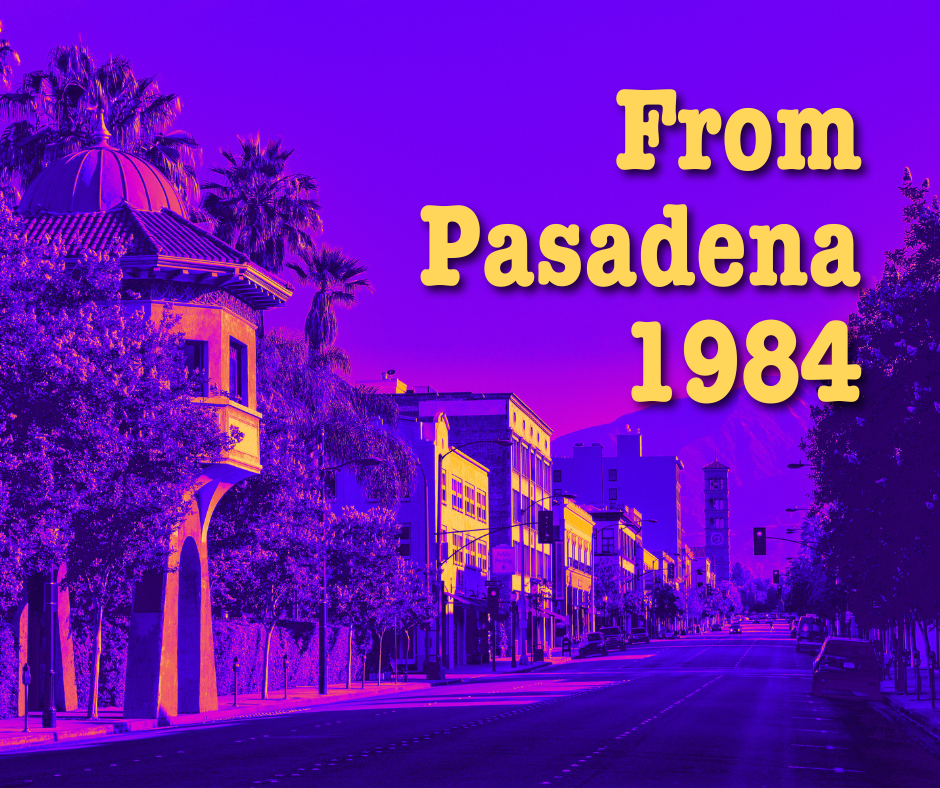An Excerpt from Pasadena 1984
Frank Armstrong, Hahn and Hahn’s estate planning specialist sat in a walnut paneled office that had the proper number of law books on library shelves, mostly California legal codes. Behind his desk he had the obligatory portrait of Ronald Reagan—probably where Nixon’s had hung.
“What you want to do is laudable,” he said, “But this town is Republican and conservative, like our law firm.”
“Pardon me,” Garland said. “I’m a Log Cabin Republican—and I cared about AIDS before it killed my lover. Now I care enough to put my money to work.”
The attorney raised his eyebrows as though surprised at meeting a gay Republican. “We take our cues from the president. He’s not said a word about AIDS.”
“That’s negligence,” I said. “Before long millions will be infected.”
“I don’t see what more the government can do.”
I laughed. “They do nothing. People are dying. We don’t even have a test for the AIDS virus. We should be working on a vaccine.”
“Consider this fair warning, I can set up any legal structure you want, and I see the merit in what you have in mind, but the residents of this city don’t want to attract a certain element that fits best in West Hollywood or San Francisco.”
“Really? The good citizens of Pasadena want ghettos for gays?” I said.
Armstrong scowled. “You know that’s not what I mean.”
“What’s the downside if I do what I want?” Garland asked.
“You were a practicing physician—urology? You went into the art business with Gonzalo Logan, correct?” He nodded. “You tell me what can happen.”
“I was shut out of the medical community. I had to quit my practice.”
I asked, “What’s the worst stigma, AIDS or being gay?”
“I see the point.”
The lawyer said, “This community has millions of dollars of fallow capital, ripe for the picking—just drive down Orange Grove Blvd to see where the donors live, but they’re old established families, not nouveau riche. They don’t like controversy.”
“Or queers,” Garland said.
“My friend, Irving Weinstein—Garland’s lover—was a fine teacher. He died of AIDS earlier this year and deserves a memorial. I’ve considered partnering with All Saints. They plan to start a community service center for AIDS in the next year or so.”
“A radical left-wing church? That’s worse.”
“Maybe we should talk with George Regas,” I said. “See how he handles the bad karma that comes from caring for sick people in this city.”
Armstrong smiled. “You guys are tough. Do yourselves a favor and meet with Bob Finch to get some political wisdom. His office is on West Colorado Blvd.”
“Nixon’s guy?”
“He’s not tainted with Watergate. He was secretary of HEW and then Nixon’s personal counselor, known as a liberal Republican.”
“You’re saying we should hold off on my idea?” Garland asked.
“You need to understand the environment,” Armstrong said. “All Saints has a two-or three-year-time line. From their anti-war activity they know this community well and know how hard it is to push new ideas.”
Walking through the parking garage on Garfield Avenue, Garland said, “How disappointing. Then again, what can the ‘good people’ of Pasadena do to us?”
“Plenty. Let’s meet with Nixon’s pal and see how enlightened he really is.”
“Maybe we should meet with Nixon. He knew how to move money.”
“You’re flipping out. Finch has a reputation for fair mindedness.”
“It’s amazing how losing my lover to AIDS changed my politics.”
“Do you have any connections in the gay community?”
“I avoided openly gay people, aside from my relationship with Irving. Being outed would have killed my practice—and ultimately it did. We spent weekends in Palm Springs, the gay Riviera.”
“Smart of you to avoid San Francisco. I suspect bath houses are what got Irv.”
“The art world is plenty gay, but it’s outside the social mainstream of Pasadena. Gay doctor, bad. Gay art dealer, who cares?”
“We need allies, leverage, and political influence—something besides our scintillating personalities.”
“Okay, for now let’s go meet with Bob Finch.”
About Pasadena 1984: The Best and Worst of Times by Henry Rex Greene
New Year’s 1984 brings big changes for 40-year-old Jerry O’Donnell. After a messy divorce, he quits his job as a teacher at Muir High School in Pasadena, California, to become a stockbroker.
When he leases a car, he meets his fiancée, Kate Cleary. The two buy a small home and have ambitious plans for the future. It is then that the AIDS epidemic raises its ugly head. After a gay friend dies of AIDS, his lover, a retired doctor, asks Jerry, the fledgling stockbroker, to help earn money for AIDS victims, but they experience strong resistance.
The remaking of Los Angeles for the Summer Olympics is a high point of the year. Jerry’s favorite baseball team, the Chicago Cubs, comes painfully close to making the World Series. At the same time, President Ronald Reagan remains silent in the face of the AIDS epidemic. He cuts taxes on the rich, causing the federal debt to soar. Kate worries about the collapse of the savings and loan industry.
Jerry becomes disillusioned with his company’s economic philosophy of “churn and burn,” selling marginal equities. When President Reagan wins an electoral landslide, it sets America’s course for the next four decades. His neglect of the AIDS epidemic motivates Jerry to apply to grad school in Public Policy.
